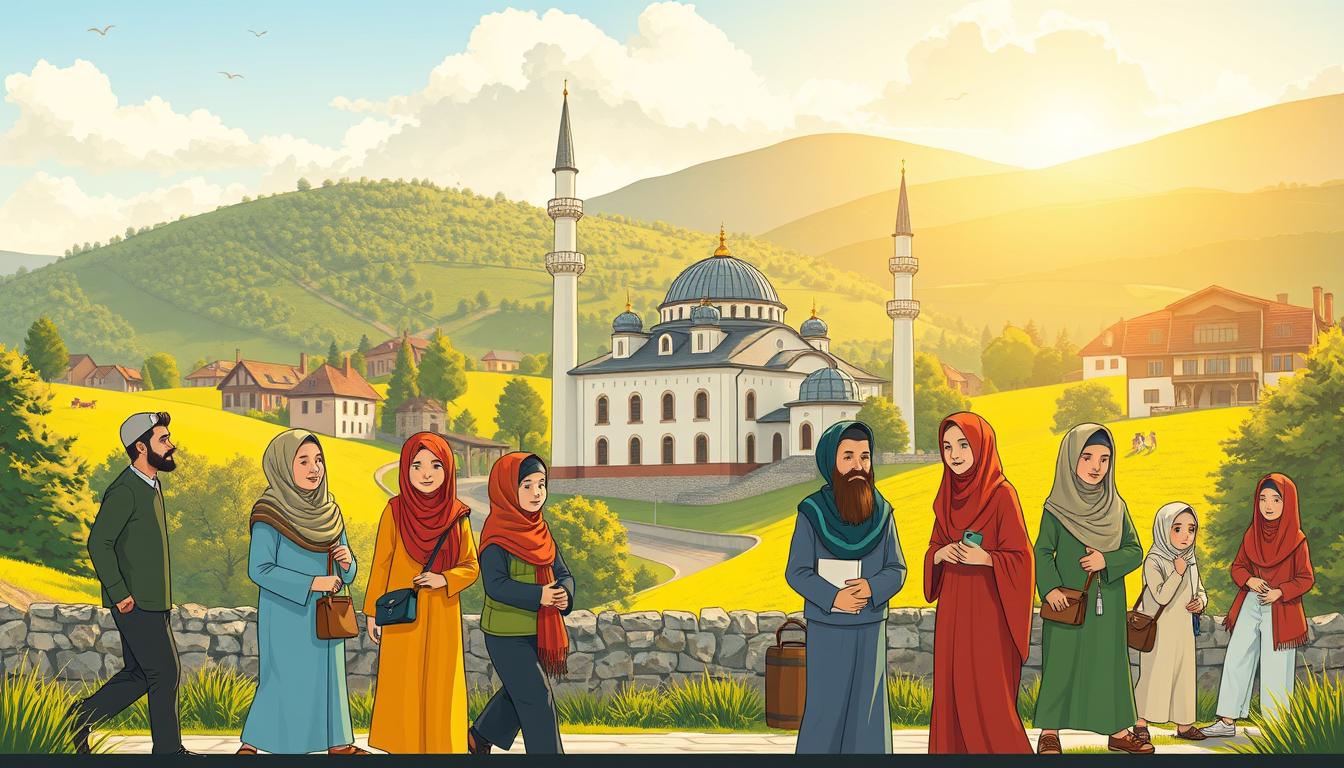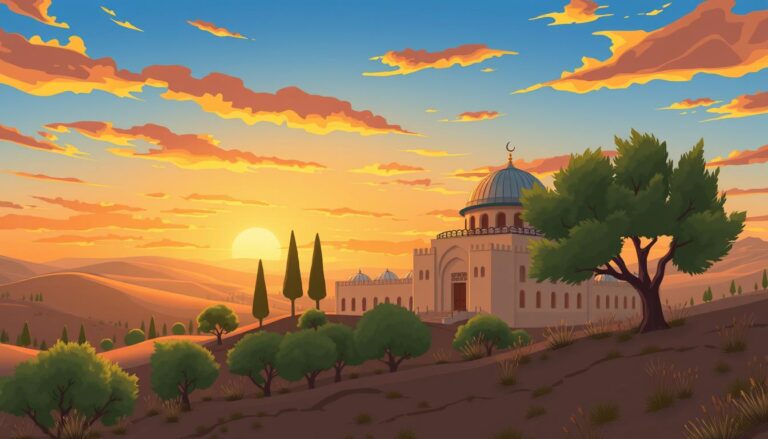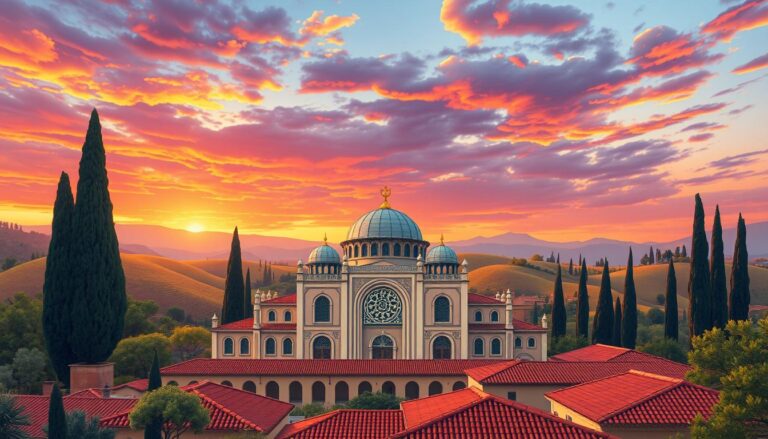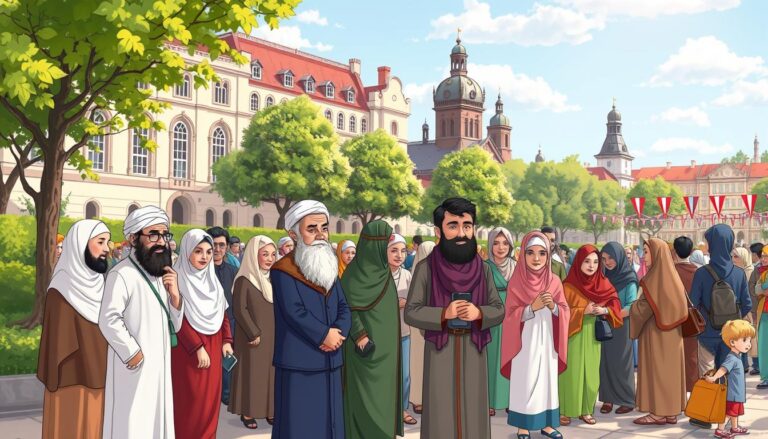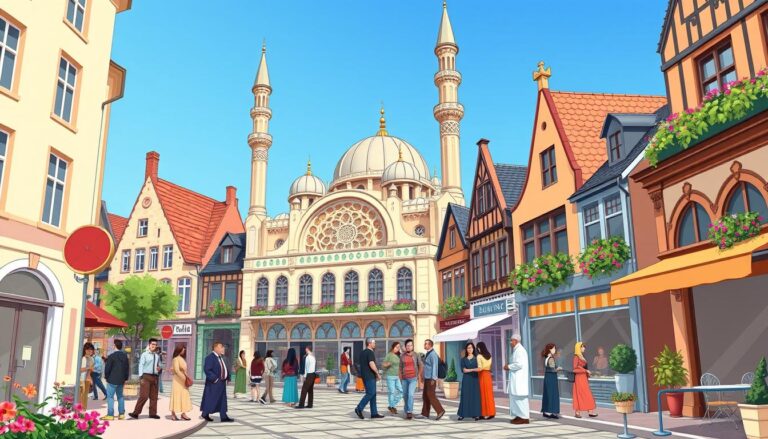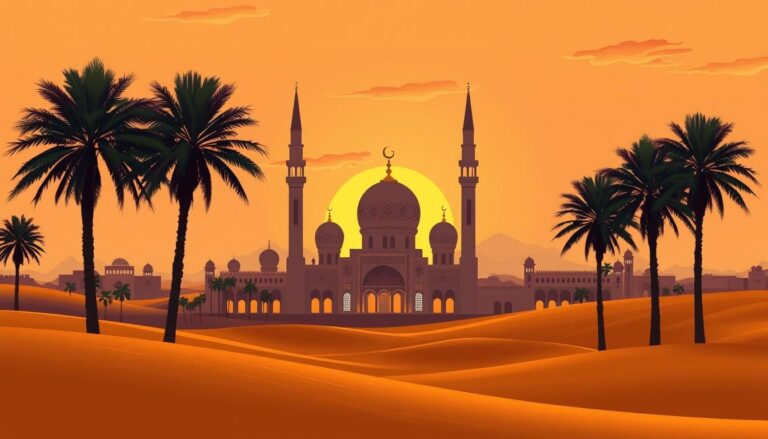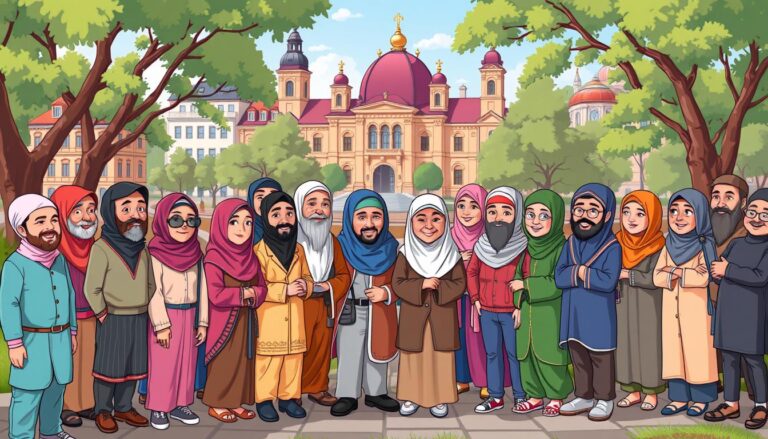Islam in Slovenia
Surprisingly, Muslims in Slovenia account for approximately 2% of the country’s total population, with their community numbering around 48,266 as of 2014. This ethnically diverse group is primarily composed of Bosniaks and ethnic Muslims, reflecting the rich tapestry of Islamic culture and traditions that have taken root in this Central European nation.
Key Takeaways
- Islam in Slovenia has a significant presence, with Muslims making up around 2% of the total population.
- The Muslim community is ethnically diverse, with Bosniaks and ethnic Muslims being the predominant groups.
- Slovenia has a history of Islamic influence, including the presence of an Austro-Hungarian mosque built during World War I.
- The construction of a new mosque in Ljubljana, Slovenia, has been a significant development, garnering attention and funding from Qatar.
- The Muslim population in Slovenia is estimated to be around 100,000, or approximately 5% of the total population.
Introduction to Islam in Slovenia
Slovenia, a small European nation, is home to a diverse religious landscape. While the majority of the population adheres to Roman Catholicism, Islam holds a significant presence, being the second-largest religious group in the country. The Muslim population in Slovenia is estimated to be around 100,000, comprising approximately 5% of the total population.
Overview of Muslim Population in Slovenia
The ethnic composition of Slovenian Muslims is diverse, with the majority being Bosniaks and ethnic Muslims. Smaller numbers of Albanians, Slovene Muslims, Roma, Montenegrins, and Macedonians also contribute to the demographics of the Muslim community. According to the 2002 census, the largest ethnic groups within the Muslim population were Bosniaks (41.95%), ethnic Muslims (19.64%), and “Bosnians” (12.05%).
The presence of Muslims in Slovenia can be traced back to various historical events, with the arrival and early establishment of the Islamic faith playing a significant role in shaping the country’s religious landscape. The demographics of Slovenian Muslims continue to evolve, reflecting the dynamic nature of the nation’s religious diversity.
“Slovenia’s Muslim population represents a vibrant and integral part of the country’s cultural tapestry, contributing to the rich diversity that defines this European nation.”
History of Islam in Slovenia
The presence of Muslims in Slovenia has a rich history, tracing back to the early 20th century during the Austro-Hungarian rule. During this time, a mosque was constructed in the village of Log pod Mangartom, built by the Bosnian-Herzegovinian Infantry Regiment No. 4 during World War I. However, this mosque was likely demolished shortly after the war’s conclusion.
The current Muslim community in Slovenia is largely composed of Bosniaks and ethnic Muslims who migrated to Slovenia from Bosnia and Herzegovina, as well as some Muslim migrant workers from Central Asia. According to the 2019 data, Islam accounts for approximately 3% of the total Slovenian population, a significant increase from the 1.5% recorded in the 1991 census and the 2.4% in the 2002 census.
Arrival and Early Presence of Muslims
The arrival of Muslims in Slovenia can be traced back to the Austro-Hungarian period in the early 20th century. During this time, a mosque was constructed in the village of Log pod Mangartom, built by the Bosnian-Herzegovinian Infantry Regiment No. 4 that was stationed in the area during World War I. However, this mosque was likely demolished shortly after the war ended.
The modern-day Muslim community in Slovenia is primarily composed of Bosniaks and ethnic Muslims who migrated to the country from Bosnia and Herzegovina, as well as some Muslim migrant workers from Central Asia. According to the 2019 statistics, Islam accounts for approximately 3% of the total Slovenian population, a significant increase from the 1.5% recorded in the 1991 census and the 2.4% in the 2002 census.
“The presence of Muslims in Slovenia has a rich history, tracing back to the early 20th century during the Austro-Hungarian rule.”
Demographics of Slovenian Muslims
Slovenia, a small country in Southern Europe, is home to a diverse population that includes a sizable Muslim community. According to the 2002 census, the largest ethnic groups within the Slovenian Muslim population were Bosniaks (41.95%), ethnic Muslims (19.64%), and “Bosnians” (12.05%). Other significant groups included Albanians (11.03%), Slovene Muslims (5.90%), Roma (1.83%), Montenegrins (1.33%), and Macedonians (1.07%). The census also recorded smaller numbers of Serbs, Croats, Hungarians, and other ethnicities within the Muslim community.
The Muslim population in Slovenia accounts for around 2.4% of the total population, which is estimated to be around 1,972,126 individuals. This diversity reflects the historical presence of Muslims in the region and the impact of regional conflicts, such as the Bosnian war in the 1990s, on the demographic composition of Slovenia’s Muslim community.
The religious landscape in Slovenia is predominantly Roman Catholic, with 57.8% of the population identifying as such. Other religious groups include Orthodox Christians (2.3%), other Christian denominations (0.9%), and adherents of other faiths (23%). The remaining 10.1% of the population is irreligious, and 3.5% is unaffiliated.
The presence of a sizable Muslim community in Slovenia, with its diverse ethnic and cultural backgrounds, has contributed to the country’s religious and social diversity, and continues to shape the evolving dynamics of the Slovenian society.
Muslim Religious Buildings and Organizations
Islam has had a presence in Slovenia for over a century, with the first mosque in the country built in the early 20th century during the Austro-Hungarian rule. However, this mosque was later demolished after World War I. It wasn’t until 2016 that the Ljubljana Mosque, also known as the Islamic Cultural Center of Ljubljana, was completed.
The construction of the Ljubljana Mosque was a significant milestone for the Slovenian Muslim community. The mosque, which measures 32/32/24 meters, is a steel structure with a transparent blue textile cupola. The center also includes a religious school building, a cultural and office program, an apartment building for community employees, and a restaurant.
The Islamic Community of Slovenia states that the Muslim population in Slovenia is approximately 100,000, making up around 5% of the total population. The community was officially registered in 1976 and has been actively involved in promoting understanding of Islam among various groups, including those who initially opposed the construction of the mosque.
The Ljubljana Mosque project was 70% funded by Qatar and cost US$16 million. The groundbreaking ceremony was attended by Prime Minister Alenka Bratušek, Mayor Zoran Jankovic, and representatives from the Islamic Community of Slovenia, including Mufti Nedžad Grabus.
Construction of Ljubljana Mosque
The construction of the Ljubljana Mosque was a significant project for the Muslim community in Slovenia. The plot of land for the mosque and cultural center was purchased from the Ljubljana city council in 2008, and the community has received donations from Qatar to fund the project.
The construction cost of the mosque is estimated to be not less than EUR 12 million, and the community currently has around 70% of the required funds. The community is planning to publish a public call for contractors in October, and construction works for the mosque could potentially commence as early as November.
The new Islamic center aims to promote understanding of Islam among various groups, including those who initially opposed the construction of the mosque. The Muslim community has overcome anti-Muslim sentiment and a referendum challenge to advance the project.
Islam in Slovenia
Islam has maintained a significant presence in Slovenian society for over a century, with the Muslim community playing an active role in the country’s religious and cultural landscape. The Islamic Community of Slovenia, led by Mufti Nedžad Grabus, represents the interests of the Muslim population and oversees the religious and social activities of the community.
While Muslims make up a relatively small percentage of the total population, estimated at around 2.5% or 80,000 individuals, they have been actively engaged in interfaith dialogue and have worked to build understanding and acceptance within Slovenian society.
The construction of the first mosque in Ljubljana, Slovenia, which cost 34 million euros with 28 million in donations from Qatar, has been a significant milestone for the Islamic community in Slovenia. The mosque, which can accommodate up to 1,400 people, demonstrates the size and importance of the Muslim community in Slovenia.
However, the mosque’s construction has not been without controversy. There were attempts to halt the project in 2004 and 2009 by requesting referendums, but both requests were denied by the constitutional court. In 2016, incidents involving pig heads and blood being thrown on the mosque construction site were reported, highlighting the tensions and opposition faced by the Muslim community in Slovenia.
Despite these challenges, the role of Islam in Slovenia continues to evolve, with the Muslim community actively engaged in interfaith dialogue and working to build bridges within Slovenian society.
“The construction of the mosque in Ljubljana represents a symbolic victory against religious intolerance and a testament to the resilience and integration of the Islamic community in Slovenia.”
Overall, the Islam in Slovenian society has a complex and multifaceted history, with the Muslim community playing a significant role in the country’s religious and cultural landscape.
Legal Status and Religious Freedom
In Slovenia, the constitution guarantees the freedom of religion and the right of individuals to express their religious beliefs in public and private. All registered religious communities have equal legal status, and the constitution prohibits the incitement of religious hatred or intolerance.
Religious groups in Slovenia are eligible for various legal and financial benefits, such as the right to provide religious services in public institutions and tax exemptions. However, the law also imposes certain restrictions, such as the requirement for animal slaughter to be preceded by stunning, which has faced opposition from the Muslim and Jewish communities.
Constitutional Protections and Restrictions
The Slovenian constitution provides strong constitutional protections for religious groups, ensuring their legal status and religious freedom. Religious communities can freely practice their faith, establish places of worship, and participate in public life. At the same time, the government maintains a degree of control over religious activities, such as the regulation of animal slaughter practices.
While Slovenia’s legal framework generally supports religious diversity and pluralism, there are concerns about the restrictions on certain religious practices, particularly those that conflict with the country’s animal welfare laws. This issue has been a source of ongoing debate and discussion within the Slovenian society.
“Slovenia’s commitment to religious freedom is evident in its constitutional protections, but the balance between individual rights and state regulations remains a complex issue that requires ongoing dialogue and compromise.”
Interfaith Relationships and Dialogue
In Slovenia, the religious communities, including the Catholic, Orthodox, Muslim, and Protestant groups, have generally reported productive interfaith relations and a commitment to interfaith dialogue and cooperation. Representatives from these communities have participated in various interfaith events and initiatives aimed at promoting religious tolerance and understanding.
In 2022, President Borut Pahor spoke at the inauguration ceremony for the new Mufti of the Islamic Community of Slovenia, calling for continued interfaith dialogue and coexistence. This gesture underscores the government’s support for maintaining harmonious interfaith relations in the country.
Slovenia has also been actively involved in the United Nations Alliance of Civilizations initiative since 2005. This international program aims to promote dialogue between Western and Muslim societies to prevent increasing polarization. In Slovenia, the initiative has focused on projects related to education, youth, media, and migration, all with the goal of fostering intercultural understanding.
“The Alliance of Civilizations initiative emphasizes the promotion of intercultural understanding in education, youth, migration, and media.”
Additionally, the concept of inter-religious dialogue for education purposes was initiated by the European Ministers of Education in their Declaration on Intercultural Education in the new European context in 2003. This has further reinforced the importance of interfaith dialogue and religious tolerance in Slovenia’s educational system.
Slovenia’s commitment to interfaith relations and dialogue is further exemplified by the country’s participation in initiatives such as the King Abdullah Bin Abdulaziz International Centre for Interreligious and Intercultural Dialogue, based in Austria. This center provides online programs to train international interreligious dialogue trainers, promoting better understanding about Islam among Europeans.
The interfaith relations and dialogue in Slovenia have been instrumental in fostering a climate of religious tolerance and mutual understanding among the country’s diverse religious communities.
Challenges and Controversies
While Slovenia generally enjoys a high level of religious freedom, the Muslim community has faced some challenges and controversies. In 2011, the Commission for Medical Ethics issued a nonbinding decision opposing circumcision for non-medical purposes, leading to many public hospitals refusing to perform the procedure and requiring some Muslims and Jews to seek care abroad or in private facilities.
The Muslim community has also reported ongoing issues with obtaining halal meals in public institutions, securing dedicated cemetery space for Muslim burials, and gaining recognition for religious worker status for married individuals. These challenges faced by Slovenian Muslims highlight the need for continued dialogue and accommodation to ensure the rights and religious practices of the minority community are respected.
Issues Faced by Slovenian Muslims
- Restrictions on circumcision for non-medical purposes
- Difficulty obtaining halal meals in public institutions
- Lack of dedicated cemetery space for Muslim burials
- Lack of recognition for religious worker status for married individuals
Despite the controversies involving Slovenian Muslims, Slovenia’s constitution and legal framework provide strong protections for religious freedom and human rights. However, discrimination against Slovenian Muslims and other minority groups remains a concern, with reports of ethnically motivated attacks and a need for more robust implementation of anti-discrimination policies.
“There is a growing consensus among policymakers and the public in the European Union about the importance of political harmony, social prosperity, cultural and religious tolerance, and acceptance of social diversity for societal cohesion.”
Moving forward, Slovenia’s efforts to combat discrimination and promote interfaith dialogue will be crucial in addressing the challenges faced by the Muslim community and fostering greater social inclusion.
Conclusion
Islam has maintained a presence in Slovenia for over a century, with the Muslim community playing an active role in the country’s religious and cultural landscape. While Muslims make up a relatively small percentage of the total population, around 5% according to recent estimates, they have been engaged in interfaith dialogue and have worked to build understanding and acceptance within Slovenian society.
The Slovenian government generally provides a high level of religious freedom, with the constitution guaranteeing the right to freedom of religion and prohibiting religious discrimination. However, the Muslim community has faced some challenges, such as issues with circumcision, halal food, and cemetery allocations, which they continue to work with the government to resolve.
Overall, the summary of Islam in Slovenia suggests a well-integrated Muslim community that enjoys a relatively high degree of religious freedom and societal acceptance, despite the small size of the population. The ongoing efforts to address the remaining challenges and promote interfaith cooperation will be crucial in ensuring the continued coexistence and integration of Muslims within the broader Slovenian context.
Source Links
- Islam in Slovenia
- Slovenia – United States Department of State
- Slovenia – Catholicism, Protestantism, Islam
- Annotated Legal Documents on Islam in Europe: Slovenia
- Religion in Slovenia
- Slovenia – United States Department of State
- Islamophobia beyond Explicit Hate Speech: Analyzing the Coverage of Muslims in Slovenia’s Public Broadcasting
- The Conflicts | International Criminal Tribunal for the former Yugoslavia
- Religious Beliefs In Slovenia
- Islamic Religious and Cultural Center in Ljubljana by Bevk Perović Arhitekti | Church..
- Mufti Hopes Muslim Centre to Promote Dialogue with All Groups
- Slovenia’s first mosque opens after 50 years
- Changing Contexts and Redefinitions of Identity among Bosniaks in S…
- Slovenia – United States Department of State
- Freedom of religion in Slovenia
- No title found
- Cable: 07LJUBLJANA283_a
- Microsoft Word – 090403_Slovenia Action Plan.doc
- Euro – Islam: The Dynamics of Effective Integration
- An Analysis of the Belief in Religious Truths Between Muslims and Roman Catholics in Slovenia and the Question of Identity

